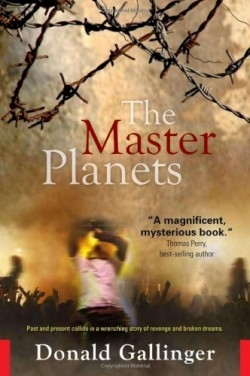The Master Planets
In 1973, Peter Jameson was nineteen years old and preparing to conquer the world with his band, the Master Planets, when echoes of his Holocaust ancestry swept in. The ordeals of having to deal with rapacious, dope-addled music executives while simultaneously com-ing to terms with his Jewish mother’s bloody past are the twin engines that drive this story. Here’s the skinny: Pe-ter’s father, a Presbyterian doctor with the U.S. Army, rescues a woman who identifies herself as Rachel Arenberg from one of Hitler’s death camps. The two marry and settle down in Sea Ridge, New Jersey, where he sets up a practice and she opens a flower shop. Their first child is a daughter, Penny. Three years later Peter is born. At the age of nine, he discovers the Beatles and ten years hence is fronting and writing songs for his own band.
Idyllic and All-American as this may sound, Peter sees ominous clouds. His mother drinks too much, keeps a psychological distance from her children and husband, and demonstrates a capacity—even a zeal—for violence, as when she expertly overpowers and then brutalizes a drug addict who attempts to rob her store. Just as Peter is immersing himself in ironing out a recording contract and a tour schedule for the Master Planets, a stranger appears at the family’s door who seems to know his mother well and who refers to her familiarly as “Leah.” The consequences of this incident will, in the long run, do more to mark the course of Peter’s life than his beloved music.
Apart from Peter (who narrates the story) and his demon-haunted mother, Gallinger’s most fully realized character is the pa-tient, all-knowing Daniel Gilaad, now an Israeli ambassador but once a Polish resistance fighter alongside Peter’s mother. Each new conversation between the two men reveals more of the mother’s shadowy past. Gallinger deftly orchestrates this clash be-tween the glitzy, egocentric rock world that first enchants Peter and the grim, self-sacrificing world his mother was forced to confront, without distorting or minimizing the significance of either. With smooth shifts from the balmy Jersey shores to the frozen Polish forests, this intriguing tale reads like a movie in embryo.
Reviewed by
Edward Morris
Disclosure: This article is not an endorsement, but a review. The publisher of this book provided free copies of the book to have their book reviewed by a professional reviewer. No fee was paid by the publisher for this review. Foreword Reviews only recommends books that we love. Foreword Magazine, Inc. is disclosing this in accordance with the Federal Trade Commission’s 16 CFR, Part 255.

